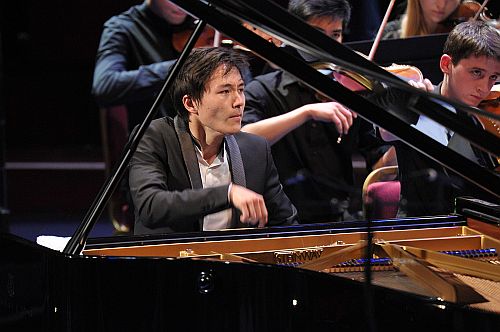 United Kingdom Prom 33: Stravinsky, Prokofiev, Birtwistle, Lutosławski, Louis Schwizgebel (piano), National Youth Orchestra of Great Britain, Edward Gardner (conductor), Royal Albert Hall, London, 10.8.2014 (CT)
United Kingdom Prom 33: Stravinsky, Prokofiev, Birtwistle, Lutosławski, Louis Schwizgebel (piano), National Youth Orchestra of Great Britain, Edward Gardner (conductor), Royal Albert Hall, London, 10.8.2014 (CT)

Stravinsky – Petrushka (1911 version)
Prokofiev – Piano concerto No. 1 in D flat major
Birtwistle – Sonance Severance 2000
Lutosławski – Concerto for Orchestra
Amidst the plethora of conductors and orchestras that grace the BBC Proms every year, those loyal regulars amongst the Royal Albert Hall audience will enthusiastically testify that the annual visit of the National Youth Orchestra of Great Britain is always an evening to relish.
The infectious, life affirming enthusiasm that emanates from the youthful exuberance of the performers on stage is no less evident in the audience, swelled as it always is by swathes of family and friends out in force to support the youngsters of the orchestra, bringing with them liberal doses of vocal encouragement.
And with Edward Gardner at the helm this year’s appearance by the NYO proved to be no exception.
In a bracing, big-boned programme of twentieth-century classics (the one exception was Birtwistle’s concise yet disproportionately powerful Sonance Severance 2000, which edged the programme into the twenty-first century by a matter of months), this was a programme tailor-made for both the remarkable virtuosity of the players as well as Edward Gardner, whose recent recordings of Lutosławski with the BBC Symphony Orchestra have proved to be models of textural clarity and interpretative insight.
Gardner’s enthusiasm for the job in hand, allied with his obvious connection with his young players was evident from the joyously busy opening bars of Stravinsky’s Petrushka, with the Shrovetide Fair bubbling over with both hustle and bustle and a radiant aura of joie de vivre. With beautifully judged dynamics and contrasts (an essential ingredient given the enormous orchestra gathered on stage), the sound of the orchestra in full flight was all the more dynamic whilst the sharply defined characterization of Stravinsky’s score for Diaghilev’s Ballet Russes was brought to life with gloriously vivid detail and remarkable commitment from the orchestra’s gargantuan forces.
The youthful brio of Prokofiev’s sparkling Piano Concerto No. 1 in D flat major proved an excellent opportunity to hear an NYO much scaled down in size from the preceding Stravinsky, whilst also proving to be a fine vehicle for the equally sparkling talents of Proms debutant and BBC New Generation artist Louis Schwizgebel.
Swiss born of Chinese parents, Schwizgebel’s performance was as pristine as the red soles of his Christian Louboutin shoes, in a work that although only one year later than Petrushka in its composition, occupies very different stylistic territory. The clarity of Schwizgebel’s articulation was ever-present in a performance that traversed the changing moods of Prokofiev’s sixteen-minute single span of music with a potent combination of confidence, playful lucidity in the Allegro scherzando and florid, free flowing momentum in the Meno mosso. This was a young man’s music perfectly matched to the youthful vibrancy of both orchestra and soloist.
At just three minutes in length, Harrison Birtwistle’s Sonance Severance 2000, written for the re-opening of the Cleveland Orchestra’s Severance Hall in 2000, is a fleeting yet impressive concert opener that packs a powerful punch, growing from its opening subterranean C major rumble in the basses to unfold in ever-increasing pulses of sound. One of the joys of listening to the NYO is the relish with which its players tackle contemporary music and in Edward Gardner’s hands, the Birtwistle was given a performance that aptly lived up to its Shakespearian epithet of ‘Let the trumpets sound the tucket sonance and the note to mount’.
In the true tradition of leaving the best until last however, the NYO’s performance of the work that launched Witold Lutosławski’ s career on an international level, emerged as the highlight of the evening. The fact that Lutosławski distanced himself from his Concerto for Orchestra in his later years was a great shame given that the work is hugely significant in bridging the gap between the music of Bartók and that of the radical and shortly to emerge New Polish School, of which Lutosławski himself was a crucial member.
Those hints of Bartók were readily audible in the NYO’s performance, yet also evident was the early, still emerging personality of Lutosławski, with Edward Gardner demonstrating his affinity with the Polish composer’s music in a performance that gripped from the start. In its initial motoric energy and rhythmic propulsion, the mercurial, fleet footed string opening to the central Capriccio and the scurrying woodwind and expertly paced cumulative impact of the final movement, the NYO’s performance proved not only a fine demonstration of the work of a master orchestrator but also one of which the orchestra should be justly proud.
With the NYO’s Proms appearance bringing down the curtain on its 2015 summer course, one hopes that the fruits of Edward Gardner’s first acquaintance with the NYO might be just the beginning of a burgeoning future relationship.
Christopher Thomas